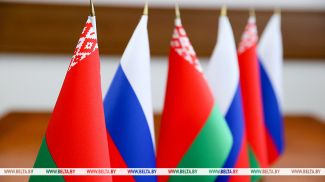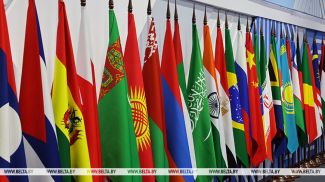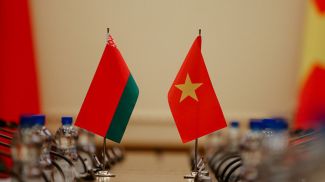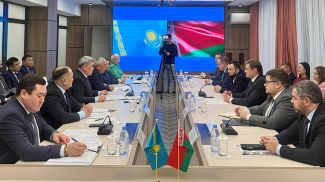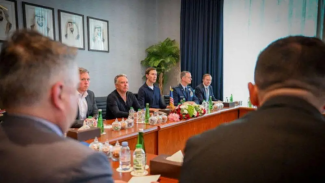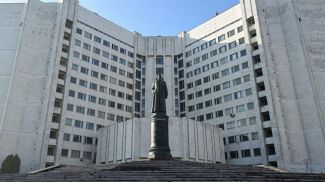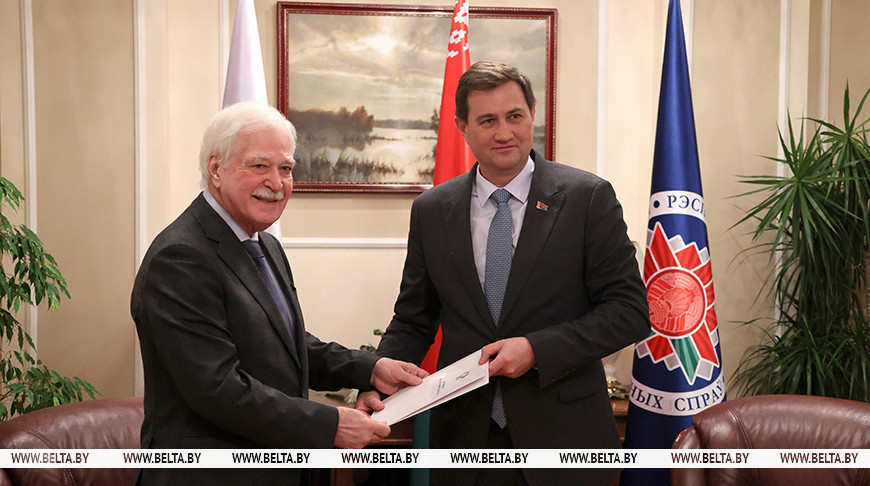
Boris Gryzlov and Maksim Ryzhenkov
MINSK, 11 November (BelTA) – Belarus has officially become a BRICS partner, the press service of the Ministry of Foreign Affairs told BelTA.
On 5 November, Belarusian President Aleksandr Lukashenko signed a letter addressed to Russian President Vladimir Putin on the country's readiness to join BRICS as a partner. Minister of Foreign Affairs Maksim Ryzhenkov handed over the document to Russian Ambassador Boris Gryzlov.
“In line with an agreement of the member states, an official response to a written invitation is mandatory for obtaining a partner status. It is from this moment that the country is officially considered a BRICS partner,” the press service of the Ministry of Foreign Affairs explained.
In his letter, the president of Belarus emphasized that since its formation, BRICS has been consistently promoting multilateral cooperation, becoming not just a symbol, but one of pillars of multipolarity. Not only the member states, but also a growing number of countries of the global majority pin their hopes for a fair world order on this association. What makes BRICS so attractive is the spirit of mutual respect and equality, its goals and common sense.
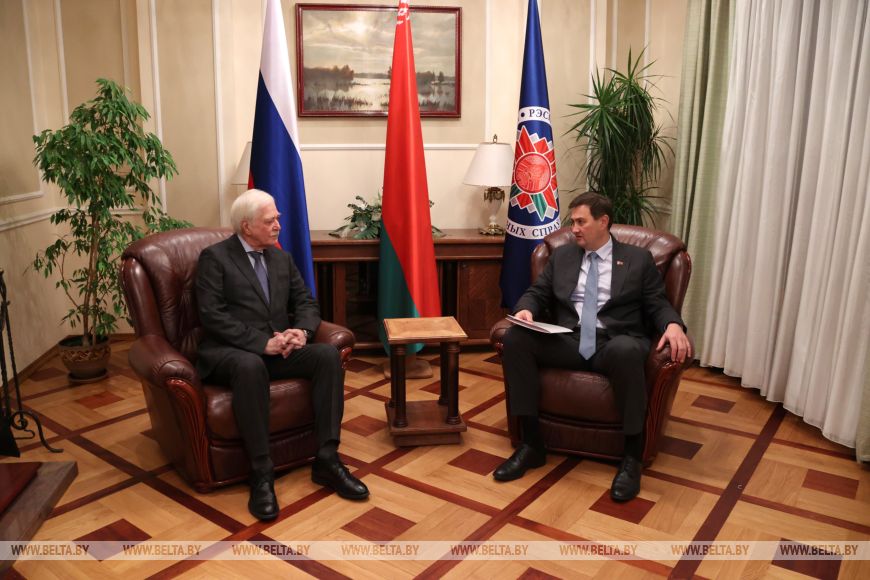
Aleksandr Lukashenko thanked his Russian counterpart for his support and pointed out that Belarus' partner status in BRICS is formalized during Russia's chairmanship, which gives him a special sense of satisfaction.
Thus, Belarus confirmed its compliance with the necessary standards and criteria and agreed to follow the guiding principles of the BRICS partner countries. Among these principles, the following are particularly notable: the spirit of mutual respect and understanding, equality, solidarity, openness, inclusiveness and consensus; a focus on strengthening the BRICS cooperation framework through partnership in three main areas: politics and security, economy and finance, culture and people-to-people contacts; a focus on boosting multilateral cooperation, promoting the multilateral system and upholding international law; accepting the goals and principles enshrined in the UN Charter as an integral element of multilateral cooperation and international law; supporting a comprehensive reform of the international financial architecture to keep up with changes in the global economic landscape, to accelerate progress in achieving the Sustainable Development Goals, and to take on board the legitimate interests of the Global South and to enhance the role and representation of developing countries in international economic and financial governance.
Belarus meets all the necessary standards and criteria, in particular, it is a state with influence in the region and the world, it has diplomatic relations with all BRICS states, it has not joined the sanctions bypassing the UN Security Council, it is committed to peace and security at the international and regional levels, it supports sustainable socio-economic development.
“The status of a partner country, among other things, implies participation on a regular basis in special sessions of BRICS summits and ministerial meetings. Partners can also be invited to other ministerial-level events, in particular, events on trade and national security, and a forum of parliamentarians. Partners can sign final documents of BRICS, thereby expanding their geographical coverage and giving more power to the voice of the association in international affairs,” the ministry noted.
On 5 November, Belarusian President Aleksandr Lukashenko signed a letter addressed to Russian President Vladimir Putin on the country's readiness to join BRICS as a partner. Minister of Foreign Affairs Maksim Ryzhenkov handed over the document to Russian Ambassador Boris Gryzlov.
“In line with an agreement of the member states, an official response to a written invitation is mandatory for obtaining a partner status. It is from this moment that the country is officially considered a BRICS partner,” the press service of the Ministry of Foreign Affairs explained.
In his letter, the president of Belarus emphasized that since its formation, BRICS has been consistently promoting multilateral cooperation, becoming not just a symbol, but one of pillars of multipolarity. Not only the member states, but also a growing number of countries of the global majority pin their hopes for a fair world order on this association. What makes BRICS so attractive is the spirit of mutual respect and equality, its goals and common sense.

Aleksandr Lukashenko thanked his Russian counterpart for his support and pointed out that Belarus' partner status in BRICS is formalized during Russia's chairmanship, which gives him a special sense of satisfaction.
Thus, Belarus confirmed its compliance with the necessary standards and criteria and agreed to follow the guiding principles of the BRICS partner countries. Among these principles, the following are particularly notable: the spirit of mutual respect and understanding, equality, solidarity, openness, inclusiveness and consensus; a focus on strengthening the BRICS cooperation framework through partnership in three main areas: politics and security, economy and finance, culture and people-to-people contacts; a focus on boosting multilateral cooperation, promoting the multilateral system and upholding international law; accepting the goals and principles enshrined in the UN Charter as an integral element of multilateral cooperation and international law; supporting a comprehensive reform of the international financial architecture to keep up with changes in the global economic landscape, to accelerate progress in achieving the Sustainable Development Goals, and to take on board the legitimate interests of the Global South and to enhance the role and representation of developing countries in international economic and financial governance.
Belarus meets all the necessary standards and criteria, in particular, it is a state with influence in the region and the world, it has diplomatic relations with all BRICS states, it has not joined the sanctions bypassing the UN Security Council, it is committed to peace and security at the international and regional levels, it supports sustainable socio-economic development.
“The status of a partner country, among other things, implies participation on a regular basis in special sessions of BRICS summits and ministerial meetings. Partners can also be invited to other ministerial-level events, in particular, events on trade and national security, and a forum of parliamentarians. Partners can sign final documents of BRICS, thereby expanding their geographical coverage and giving more power to the voice of the association in international affairs,” the ministry noted.




